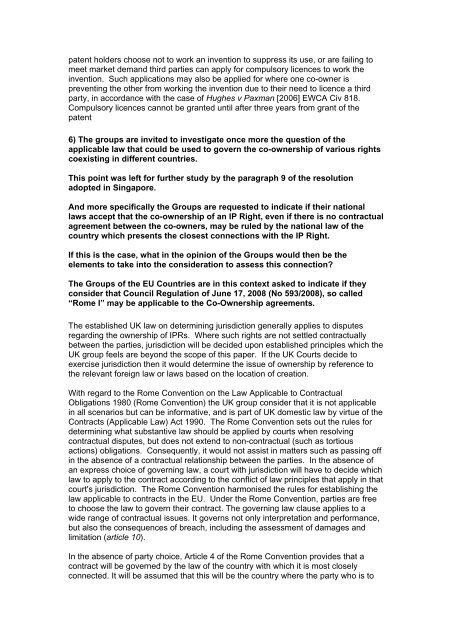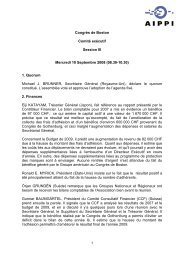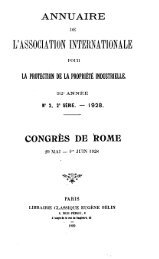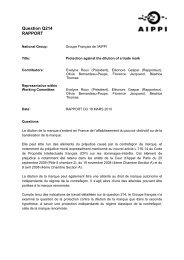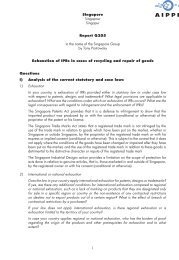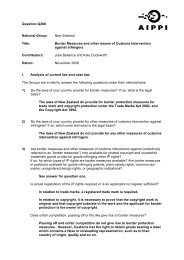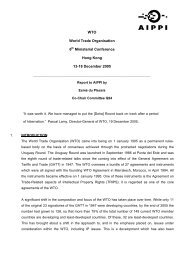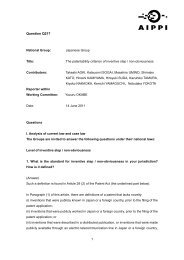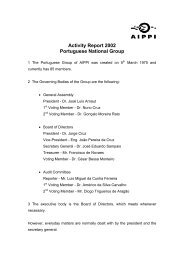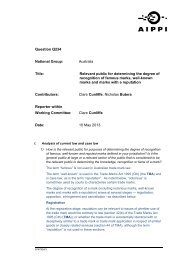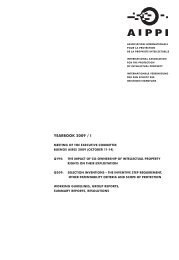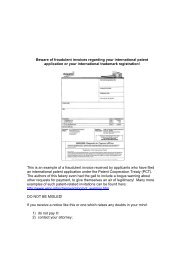Question Q194 National Group: United Kingdom Title: The ... - AIPPI
Question Q194 National Group: United Kingdom Title: The ... - AIPPI
Question Q194 National Group: United Kingdom Title: The ... - AIPPI
You also want an ePaper? Increase the reach of your titles
YUMPU automatically turns print PDFs into web optimized ePapers that Google loves.
patent holders choose not to work an invention to suppress its use, or are failing to<br />
meet market demand third parties can apply for compulsory licences to work the<br />
invention. Such applications may also be applied for where one co-owner is<br />
preventing the other from working the invention due to their need to licence a third<br />
party, in accordance with the case of Hughes v Paxman [2006] EWCA Civ 818.<br />
Compulsory licences cannot be granted until after three years from grant of the<br />
patent<br />
6) <strong>The</strong> groups are invited to investigate once more the question of the<br />
applicable law that could be used to govern the co-ownership of various rights<br />
coexisting in different countries.<br />
This point was left for further study by the paragraph 9 of the resolution<br />
adopted in Singapore.<br />
And more specifically the <strong>Group</strong>s are requested to indicate if their national<br />
laws accept that the co-ownership of an IP Right, even if there is no contractual<br />
agreement between the co-owners, may be ruled by the national law of the<br />
country which presents the closest connections with the IP Right.<br />
If this is the case, what in the opinion of the <strong>Group</strong>s would then be the<br />
elements to take into the consideration to assess this connection?<br />
<strong>The</strong> <strong>Group</strong>s of the EU Countries are in this context asked to indicate if they<br />
consider that Council Regulation of June 17, 2008 (No 593/2008), so called<br />
“Rome I” may be applicable to the Co-Ownership agreements.<br />
<strong>The</strong> established UK law on determining jurisdiction generally applies to disputes<br />
regarding the ownership of IPRs. Where such rights are not settled contractually<br />
between the parties, jurisdiction will be decided upon established principles which the<br />
UK group feels are beyond the scope of this paper. If the UK Courts decide to<br />
exercise jurisdiction then it would determine the issue of ownership by reference to<br />
the relevant foreign law or laws based on the location of creation.<br />
With regard to the Rome Convention on the Law Applicable to Contractual<br />
Obligations 1980 (Rome Convention) the UK group consider that it is not applicable<br />
in all scenarios but can be informative, and is part of UK domestic law by virtue of the<br />
Contracts (Applicable Law) Act 1990. <strong>The</strong> Rome Convention sets out the rules for<br />
determining what substantive law should be applied by courts when resolving<br />
contractual disputes, but does not extend to non-contractual (such as tortious<br />
actions) obligations. Consequently, it would not assist in matters such as passing off<br />
in the absence of a contractual relationship between the parties. In the absence of<br />
an express choice of governing law, a court with jurisdiction will have to decide which<br />
law to apply to the contract according to the conflict of law principles that apply in that<br />
court's jurisdiction. <strong>The</strong> Rome Convention harmonised the rules for establishing the<br />
law applicable to contracts in the EU. Under the Rome Convention, parties are free<br />
to choose the law to govern their contract. <strong>The</strong> governing law clause applies to a<br />
wide range of contractual issues. It governs not only interpretation and performance,<br />
but also the consequences of breach, including the assessment of damages and<br />
limitation (article 10).<br />
In the absence of party choice, Article 4 of the Rome Convention provides that a<br />
contract will be governed by the law of the country with which it is most closely<br />
connected. It will be assumed that this will be the country where the party who is to


